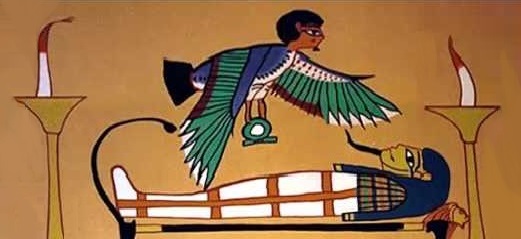What is Life, Death, and Salvation?
By Matthieu on Thursday, December 1 2016, 08:10 - Permalink
A Bible reading session last month posed the question of the afterlife (Mt 22). After a long exploration of the topic, I came to think that it involves questioning the very definition of life and death themselves! Using my habit of emergent layers, applied to an individual person (cf. numeral symbol by Bernard Werber), I came out with this table to describe what it means to be alive or dead:
|
Evolution levels |
State of Life |
State of Death |
|
5. Saint (spiritual) |
Hope, Faith, Love |
Despair, denial/betrayal, hate |
|
4. Human (mental) |
Personality, intelligence, humour |
Madness, mental handicap |
|
3. Animal (emotional) |
Sensory and emotional reaction, desires |
Lethargic, vegetative state |
|
2. Plant (biological) |
Biological life, health |
Handicap, decease |
|
1. Mineral (physical) |
Body, physical presence |
Disaggregation |
|
0. Through others (vicarious) |
Name, stories, worship, statue |
Oblivion |
This table matches the cardinal cycle and the 4 fields of education, with 2: sport for the body, 3: art for the heart, 4: science for the mind, and 5: wisdom for the soul. I also add a “zero” level which corresponds to our life (and survival!) through others: how we are known and remembered. With this table, it appears that death is often gradual: being handicapped, desperate, and ignored, already cripples the wholeness of our life. Often the death of the higher levels would cause the lower ones in turn to crumble. However we can also imagine the death of an unknown person, keeping quietly his wisdom and conscience till the end.
The above table may seem to over-analyse life and death, cutting it into thin nuances, but actually the Greek vocabulary of the New Testament also does so! One of my cousin underlined that in the Gospels there is a distinction between 3 forms of life: Bios: life of the body (2) and (3), Psyche: life of the mind (4), and Zoe: eternal life of the soul (5). We can also match these with the 3 loves: Eros of the body, Philia of the mind, and Agape of the soul. As I like to believe, vocabulary and grammar help with philosophy.
From the etymological angle, resurrection comes from the Latin "resurgere", "to spring up again", akin to "source" but without the idea of "origin". In Chinese 復活 is "return to life", in Vietnamese Phục sinh 復生 is "rebirth". In Greek Ανάσταση: "stand up". It sounds sometimes like a return to our previous life, or the start of a new one.
If we consider that, in the face of his death, a man’s salvation consist in keeping his life, it seems that most cultures tend to focus on the lower levels: a grave, a legend, a statue to remain in people’s head (0), and sometimes a mummy to keep the body. Then many religions and beliefs promise to restore the body (1), bring it back to physical life and health (2), enjoy a paradisaical existence of pleasures (3), and optionally some grand revelations (4).

What if it were the other way around, eternal life through the higher levels? Simply survive as spirits (4), free from bodily life and heaviness, taking with us the most precious fruits of our soul (5). Like the butterfly leaving the caterpillar cocoon. In Christian context, the realization of divine salvation implies the irrelevance of hope and faith: only love is to remain. Christian theology tells however that the body will be restored, in an uncorruptible form, because God created matter as part of a good creation, as opposed to gnostics who believe that matter is an evil prison for the soul.
Could this utlimate bliss scene also mean to abandon our individuality? Meeting face to face with God should be a fantastic love burst, surely calling for a fusion, following the example of the Trinity. That would mean that even our own self (4) fades out as we merge back into the source of light.
Even further, if this salvation leads to an eternal state of perfection, could time disappear? Time would mean motion and evolution, but hard to imagine a dynamic perfection lasting forever! It would necessary imply fluctuations around the optimum, and the absence of overall increase of excellence would mean terrible boredom for the spirits endowed with memory. Even if their memory were wiped regularly so that they may enjoy the same perfect (groundhog) day forever, that would be a kind of time-loop, not so different from a mere interruption of time. Hard to imagine what could be existence without time, our intimate and yet mysterious life drug! We could be either without time (hit into a bliss wall the end of the road, just like the Big Bang sprung from nowhere), or beyond time, seeing it from above like a spiralling track from its beginning till its end.